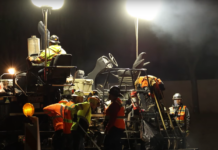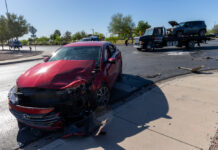The big orange box may bring with it a big green light for development in Maricopa.
Atlanta-based Home Depot, the world’s largest home-improvement chain with more than 2,300 stores in North America, is coming to Maricopa, the city confirmed this week. The store, expected to be a full-size, roughly 100,000-square-foot facility, will be built at Stonegate and Maricopa-Casa Grande Highway.
While it fills a need for tens of thousands of residents, who have had to drive to Chandler or Casa Grande to its next-closest stores, it likely will mean much more to the city in the long term, City Manager Rick Horst said.
“Other things are likely to accompany it from just the fact we announced it,” Horst said. “Home Depot is a significant retailer for us and, of course, they will attract others. If you look around the greater Phoenix area and you see one of these big-boxes pop up, a lot of other businesses like to sit next to them. They like to sit next to each other.”
In communities like Chandler and Gilbert, whenever Home Depot or Lowe’s builds, the other quickly goes up nearby, too.
While Home Depot is on the southeastern side of Maricopa, it has long been rumored that Lowe’s is interested in Maricopa Station, near John Wayne Parkway and Maricopa-Casa Grande Highway.
“I can tell you they’re nosing around,” Horst said of Lowe’s. “But that’s all I know at this point.”
So are others. Restaurants, for example, draw other restaurants.
“Certainly, Cold Beer and Cheeseburgers is off to a terrific start,” Horst said. “We provide data to a lot of people, and a lot of people are coming in.
“What people don’t realize is the sales averages here in our community are anywhere from 30 to 69 percent higher than the national average. People are becoming aware of that.”
Horst points out that landing Home Depot – really for the second time – was a 15-year battle, caused in large part by the Great Recession and then by the COVID-19 pandemic.
“Everyone forgets, because most of our public today was not here then, is that when our city began, we were one of the fastest growing, if not the fastest growing in the entire nation,” he said. “We were processing up to 1,500 homes in a month.”
Then, in the wake of the recession, Maricopa came to be dubbed The Great Foreclosure Capital of the World.
“Overcoming that negative tone and getting to a place where we began attracting interest again, a lot had to do with how we conduct business as city, being more business friendly and less bureaucratic,” Horst said.
While doing away with business licensing cost the city about $800,000 a year, Horst said it allowed those businesses to put those savings back into their businesses. That, in turn, helped build a broader tax base for the city.
“Our attitude is businesses and residents have a choice. They don’t have to come here,” Horst said. “In essence, we’re in competition with our fellow communities. We have to do things better, quicker, have a better quality of life and a lower crime rate. All those things make a difference at the end of the day.
“We’re not perfect, but we, as community that will be 20 years old this October, have surpassed other communities that have taken them 30, 40, 50 years to get where we are today. So, I think we have a pretty good track record. Not perfect. We continue to learn. We try to make adjustments. But in a family of 70,000, we’re not going to make everybody happy, but we make most of them happy.”




![Shred-A-Thon to take place tomorrow An image of shredded paper. [Pixabay]](https://www.inmaricopa.com/wp-content/uploads/2024/03/shredded-paper-168650_1280-218x150.jpg)












![Shred-A-Thon to take place tomorrow An image of shredded paper. [Pixabay]](https://www.inmaricopa.com/wp-content/uploads/2024/03/shredded-paper-168650_1280-100x70.jpg)
